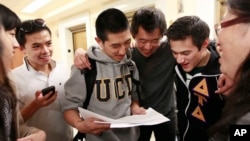A new group plans to spend millions of dollars to register and turn out Asian-American voters in a handful of U.S. swing states, a bid to give the relatively small but fast-growing group outsize influence in the November 8 presidential election.
If successful, the effort could give voice to a portion of the electorate that has traditionally leaned Democratic but has voted in lower numbers than other minority groups and has been largely ignored by candidates in past presidential elections.
The AAPI Victory Fund plan to spend $2 million to register at least 50,000 voters before Election Day in states – such as Nevada, North Carolina and Virginia – where it says the number of eligible Asian-American voters exceeds the margin of victory in the 2012 presidential poll.
"If this community were to turn out more, it can actually swing the election," said Dilawar Syed, the fund’s co-founder and vice chairman. As a super PAC, the political action committee can raise unlimited funds for a political goal but cannot coordinate with candidates.
Nonpartisan effort
The AAPI Victory Fund, launched in January, is nonpartisan. But Asian-Americans have tended to vote Democratic, meaning the efforts are more likely to benefit Hillary Clinton, who is close to clinching her party's nomination, in a general election against a Republican.
The group has so far seen more than 3,500 new voters registered among people who received its first round of 73,371 mailers, sent out in late March. It plans another round of mailers in June and perhaps another in September.
Other target states include Colorado, Ohio and Florida, according to the group.
The nation’s 19.4 million Asians make up about 5.6 percent of the U.S. population, according to Census data. By comparison, African-Americans, who make up just over 13 percent, have been a powerful force in the presidential primaries, helping Clinton to beat Sanders in southern states.
But Asian-Americans are now the country’s fastest-growing ethnic group, said Mark Hugo Lopez of the Pew Research Center. "By 2060, Asians will surpass blacks in terms of population numbers," he said.
In the 2014 election, Asian-Americans' voter registration rate of 50 percent was lower than in some other groups: 63 percent for blacks and 66 percent for whites. One factor could be that Asians and Pacific Islanders – people of a number of ethnicities and national origins – have been largely overlooked in past elections.
New contact
Shekar Narasimhan, the fund's chairman and founder, suggested new contact from the group could turn that around. "Nobody's asked you anything before, and suddenly you get a piece of mail saying you are relevant," he said.
The AAPI Victory Fund is not the only group looking to register and turn out Asians at the polls. The nonprofit APIAVote, for example, does similar work. But its efforts are aimed broadly, looking less to influence specific swing states than to raise Asian-American voter engagement across the country.
Both political parties, and some presidential candidates' campaigns, also have looked to draw those voters in.
"I want more Asian-Americans of all ethnicities to be part of our political process," said Jason Chung, the Republican National Committee's director of Asian Pacific American engagement.
Campaign efforts
The Clinton campaign said it has worked on voter turnout among Asian-American and Pacific Islander communities. The candidate did numerous stops in Asian neighborhoods before her recent win in New York's primary, including going for bubble tea in Flushing, an Asian neighborhood in New York City.
Clinton was the only presidential candidate scheduled to appear at a reception next week held by an Asian American and Pacific Islander group in Washington, D.C.
The campaigns of Democrat Bernie Sanders and Republicans Ted Cruz and Donald Trump did not respond to requests for comment. Niraj Antani, a member of the Ohio House of Representatives who supports Republican candidate John Kasich, the state's governor, said Kasich values diversity.
The AAPI Victory Fund has not endorsed any presidential candidate, but Narasimhan, the fund's chairman, said it plans to later this year. A number of its leaders are donors and fundraisers within Democratic circles.
Narasimhan, who is personally backing Clinton in the election, said the fund would partner with various Asian American and Pacific Islander community groups closer to the election to make sure those newly registered voters go to the polls.






